Thank you - from the deepest depths of my heart to those who either pre-ordered or since ordered a copy of The House in the Hedge. Thank you!
Right…today I’m going to talk about the actual drafting of the book - mostly as a cautionary tale, both to myself and any other curious writerly types out there.
So, after the amorphous soup generated the idea for Hazel’s story, it was time to actually start writing it. After glancing through my various notebooks (more on those anon) I see that I started with a scene that had little to do with what the story ended up being. That, in and of itself, is fairly representative of how the whole process went, which is to say, chaotic.
I’ve always identified as a pantser - or, discovery writer, or non-outliner or whatever else folk who don’t start with detailed outlines call themselves (plotters). I personally prefer the label intuitive writer because it perfectly encapsulates my experience and because I rarely write the entire novel without pausing to do some form of planning or outlining. I tend to get to a point where I have to stop and sort out where I’m going, so in that respect, I’m sort of a hybrid - a plantser, if you will.
The Notebooks
Here’s where my system of notebooks comes in.
I’m a total philistine when it comes to my writing notebooks1. For my fiction notebook needs, I go straight to the back-to-school sales bins at Wal-Mart. My hands-down preference are composition notebooks and those thin, 32-page exercise books that you get in packs of five.2
Now, maybe that says something about how much I value my writing (not enough to give it a glorious vessel in which to be birthed), or it’s a reflection of my self-worth (I’m not worthy of having nice things)3 but it’s mostly a function of budget and practicality. I write a LOT of absolute crap in those books…meandering, scattered thoughts, random tidbits and complete passages that come to nothing beyond letting me decide the colour of someone’s eyes. I need the freedom of a non-precious notebook in which to scribble my nonsense.
Also, cheap paper crinkles in a very pleasing manner when it’s been scrawled on by ballpoint pen and when you’re constantly flipping back and forth, it adds a joyous auditory experience. 🤓
I use the exercise book for first thoughts and musings. It’s also where I’ll do any research that’s necessary. I had to do a lot of research into English Land Law for this book - more than will ever be revealed in the final manuscript, that’s for sure #rabbithole - and that’s where I made my notes. It’s also where I mapped out timelines and geography as well as tracking my writing sessions and word-counts. It’s primarily first/second draft stuff.
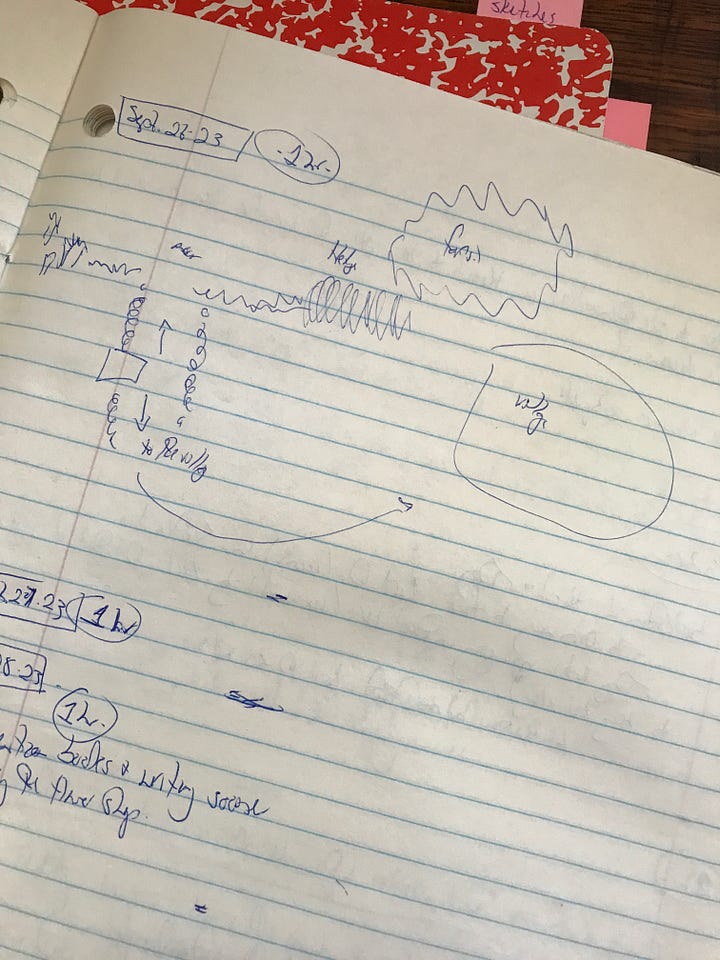
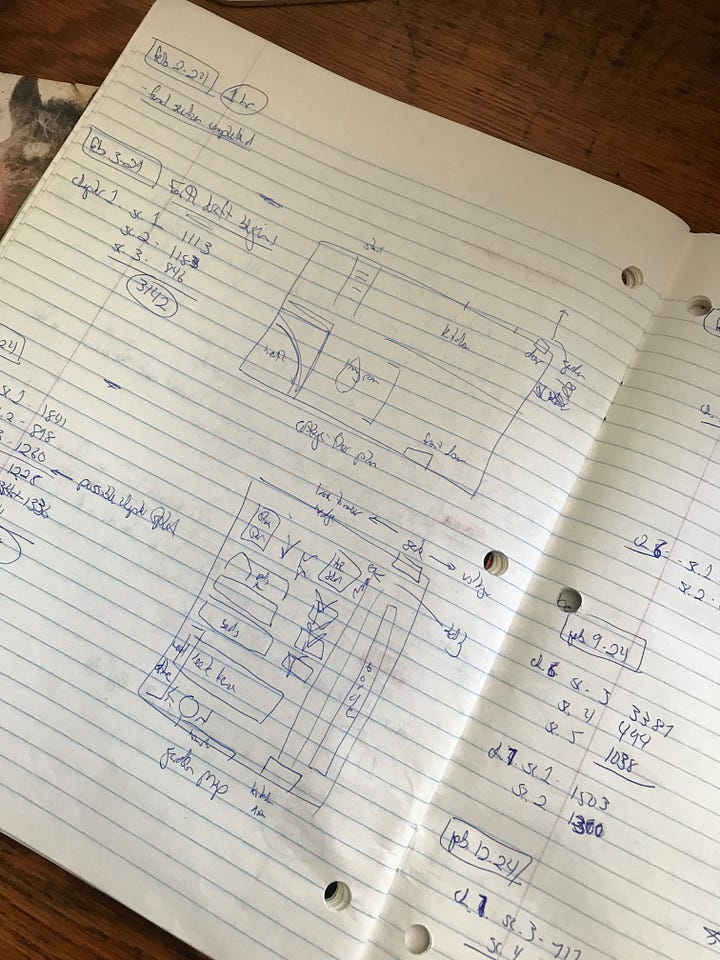
In the composition notebook, I do a lot of discovery writing. I’ll journal about what I think the story is doing, where I want it to go; I’ll write through stuck places or plot-holes. I’ll write about the theme and do detailed character sketches - both physical and psychological/emotional to sort out motivations and arcs. It’s also where, as I move through the different drafts, I make editorial notes and track my to-dos , ie. things/people that need names or proper descriptions. It’s in this notebook where I do any of the reverse-engineering of plot which, had I been an outliner, would have been done before I started. 🤓
Next, I move to the index cards. This is a final-stage editing tool for me. As I read through each chapter, I take note of what’s happening and why, to make sure that each scene, each chapter has a purpose and moves the story along in some way. I suppose I could do this on paper, but I like to have the option to see a big picture if necessary, in case things need to be moved around.
Digital vs. Analogue
There are a plethora of digital planning tools available these days - even Scrivener has those features built in and are easy to use. I know a lot of people use Notion, which is free, as well as Google Docs to plan their novels. I see the attraction and definitely the benefit, I mean everything is indexed and available at your fingertips. It would certainly be faster than flipping through pages and rummaging for scraps of paper and notebooks shoved in drawers. Despite having tried to use these fabulously modern inventions, I remain a steadfast analogue girl. It’s paper and pen all the way.
Is it the most efficient way? Probably not.
Could I save time and energy and frustration? Quite likely.
Would it make me a better writer? Maybe, but then I also wouldn’t get the pleasing crinkle sound of turning pages filled with the wild scribblings of my brain. You can’t recreate that kind of magic with a screen. 🤓4
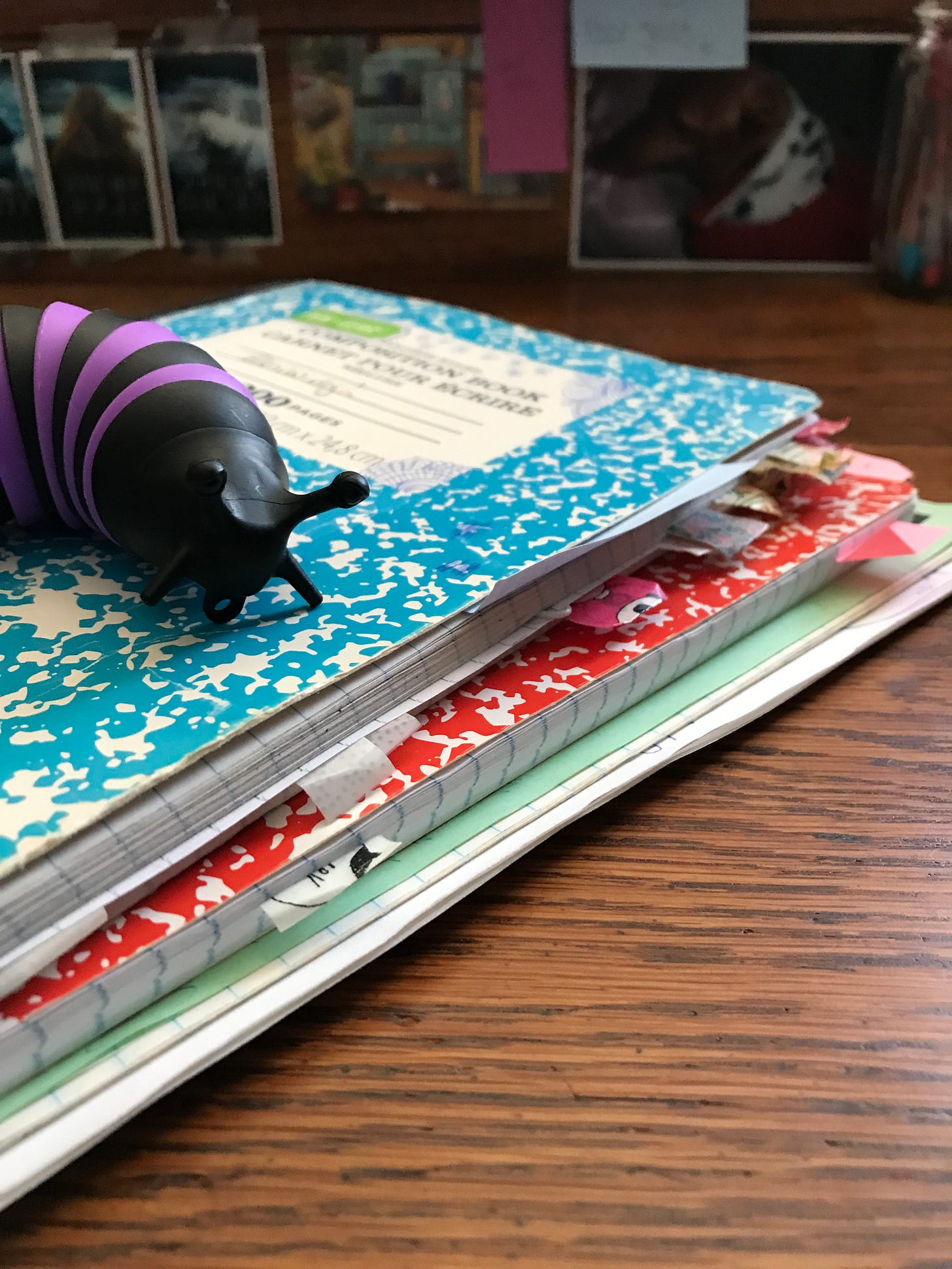
Chaos magic
Written out like this, it all seems very linear and sensible. I start with an idea, write some thoughts in a notebook, tap out some words on a screen, write some more thoughts in a notebook then finish with an inventory on index cards. Hey presto! Finished novel.
I would like, very much, if that were the case. I’ve written a few books now, and this one was by and large, the most chaotic in its manifesting. Because I wrote it in fits and starts, with large gaps in between, it had a LOT of issues - giant plot-holes, meandering, vague and petering out story-lines. Most of what I’ve described here was me going back to the original draft and starting over, using the system I’ve described. Not having an outline from the start probably cost me hours upon hours of work. Then again, would I have found the story that I did, if I’d planned it all out in advance? Or did I need to thrash about in the weeds wander about in the shrubbery for a while? Who knows.
If anything, working on this book has taught me how I want to write the next one - which is to say, with a just a bit more structure to it before I begin. I won’t ever be a hardcore plotter, but I think I would like at least a skeleton framework. I think that writing in a series helps with that, because you’ve already figured out the foundational elements, so it’s easier to move ahead with new stories in the same world.
Time to crack open a new exercise book, then, wot?
So there you have it…my (possibly) strange and (definitely) meandering drafting process.
Once again, here’s me doing the Responsible Book Marketing thing and giving you conveniently-placed calls-to-action with clear destinations:
Many thanks, again, to those who pre-ordered. I managed to surpass my modest little goal for pre-orders and so am thoroughly chuffed. Your support and encouragement is the veritable fuel upon which my words are powered. The paperback is also available now, so if you’re a book-in-my-hands (as am I) kind of reader, then I’ve got you covered.
Next time, I’ll cover my editing process — including a scandalous admission — so stay tuned. I promise, after that, I’ll shut up about it.
more, soonish,
~m.xo
I actually do appreciate a beautiful notebook - and even have a couple of lovely ones - just not for my fiction work.
This novel is the first time I’ve used the exercise book and it’s a total game-changer
I categorically do not believe these things are true and mention them here because those are statements I’ve heard bandied about in the mindset-adjusting spheres. A beautiful notebook may be just the thing to inspire someone else to treat their writing as a sacred, important exercise and if that’s what it takes, then I certainly celebrate that.
Well, maybe there’s plotting software out there that has a page-turning sound option in the settings. 🤷🏻♀️


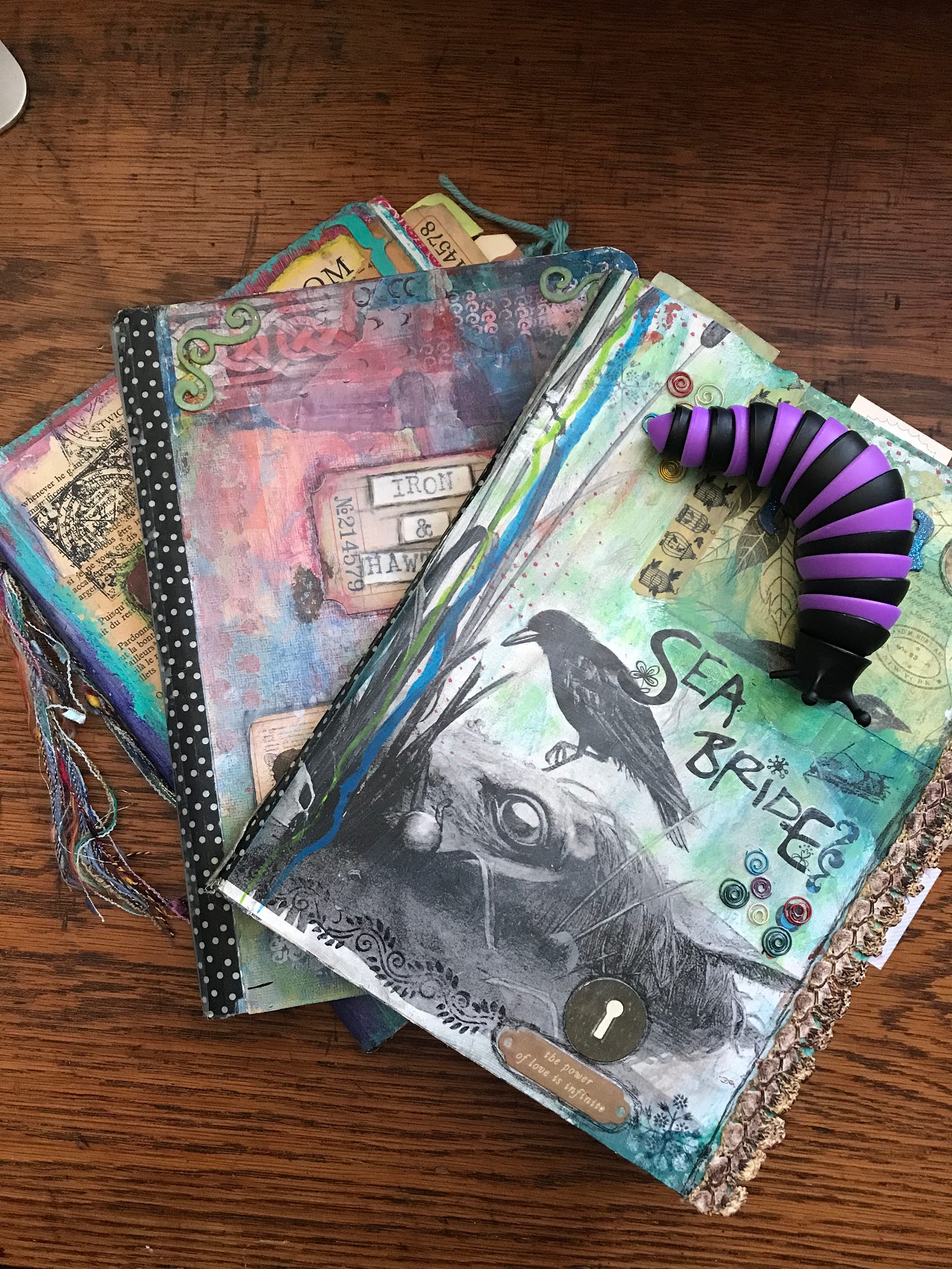
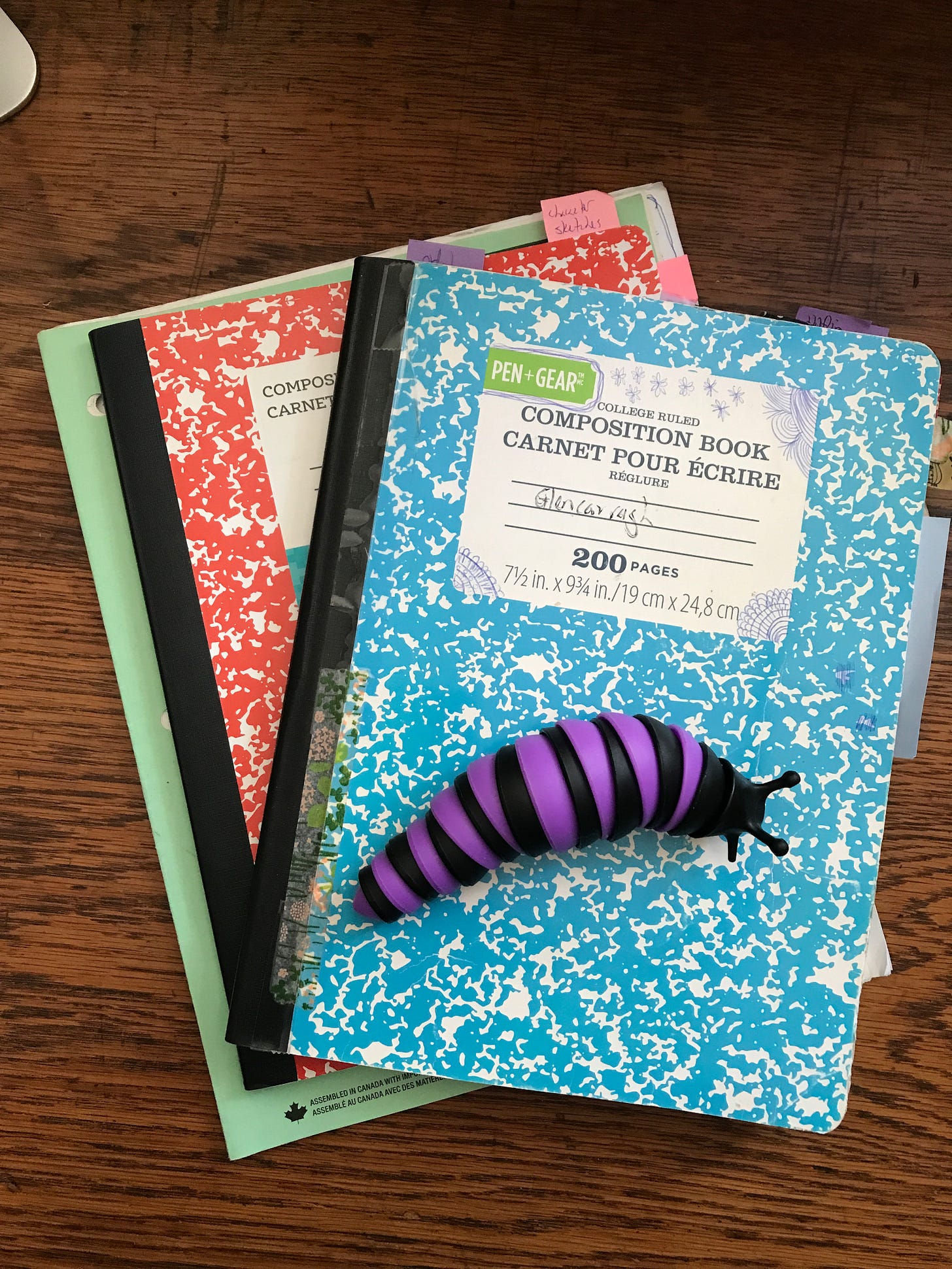
Intuitive process all the way! Loved reading about your’s. 💙 And those original notebooks!! So much artsy love there. My history of art journals (comp notebooks also, woot!) are the same. The covers used to be so elaborate and detailed. Now they’re quite simple. But I’m making a lot more 3-D art these days so that’s where the creative energy goes instead. Have ordered my book (sound and feel of pages turning!)and now must wait patiently till next week. Tapping fingers. So excited for you and your continued journey in writing. Really truly wonderful!! Way to go to stick to it through all the murky waters of doubt and angst. Huzzah!! 🥳
Hi Mel, so excited to have your new book ready, just about to get stuck in! Loved reading about your writing process. So pleased you stuck with it. Enjoy your well deserved success x